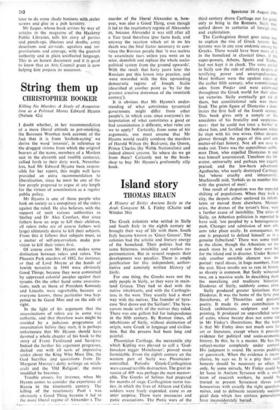Island story
THOMAS BRAUN A History of Sicily: Ancient Sicily to the Arab Conquest M. L Finley (Chatto and Windus 36s) The Greek colonists who settled in Sicily and South Italy in the eighth century BC brought their way of life with them. South Italy became known as 'Great Greece'. The colonies had the artistic and literary energy of the homeland. Their politics had the same bitterness, instability and restless ex- perimentation. But in several respects their development was peculiar. There is ample justification for this independent, author- itative and concisely written History of Sicily.
For one thing, the Greeks were not the only people in Sicily, as they were in main- land Greece. They had to deal with the native inhabitants, and with the Carthagin- ians in the west. They usually had a short way with the natives. The founder of Syra- cuse 'first drove out the Sicilians'. The Syra- cusans made serfs of the natives they ruled. There was one gallant bid for independence in the fifth century. By Roman times, all inhabitants of Sicily, without distinction of origin, were Greek in language and civilisa- tion. But the process had been long and painful.
Phoenician Carthage, the mercantile city which Kipling was pleased to call a 'God- forsaken nigger Manchester', proved more formidable. From the eighth century on the western part of Sicily was Phoenician- controlled. Periodic Greek-Carthaginian wars caused terrible destruction. The great in- vasion of 409 was perhaps the most memor- able. The Greeks of Selinus had prepared for months of siege. Carthaginian storm tac- tics, in which the lives of African and Celtic soldiers were freely expended, came as an utter surprise. There were massacres and panic evacuations. The Punic wars of the third century drove Carthage out for good, only to bring in the Romans. Sicily then settled down to centuries of foreign rule and exploitation.
The Carthaginian threat goes some way to explain the rise of Greek tyrants. But tyranny was in any case endemic among the Greeks. There would have been more of it in the homeland in classical times, if the super-powers, Athens, Sparta and Thebes. had not kept it in check. The same period in Sicily saw the rule of military despots of terrifying power and unscrupulousness. Most brilliant were the opulent rulers of the earlier fifth century, who commissioned odes from Pindar and were celebrated throughout the Greek world for their char- iot victories. Sicily eventually got rid of them, but constitutional rule was short. lived. The grim figure of Dionysius I dom- inates the first half of the fourth century. This book gives only a sample of the anecdotes of his brutality and suspicious. ness: that he could not trust a barber to shave him, and fortified the bedroom where he slept with his two wives. Other despots glower through the pages of this cool and matter-of-fact history. Not all are easy to make out. There was the supercilious noble- man Dion, who expelled Dionysius ti and was himself assassinated; Timoleon the lib- erator, universally and perhaps too eagerly praised; and the low-born adventurer Agathocles, who nearly destroyed Carthage. but 'whose cruelty and inhumanity, Machiavelli said, 'forbids us to number him with the greatest of men'.
One result of despotism was the repeated shifting of populations. When they took a city, the despots either enslaved its inhabi- tants or moved them elsewhere. Mercen- aries, the drones of the tyrant's hive, were a further cause of instability. The cities of Sicily, an Athenian politician is reported to have said, 'are peopled by a heterogeneous mob. Changes and admission of new citi- zens take place easily. In consequence, no one is prepared to defend himself as in a genuine fatherland.' There was some truth in the claim, though the Athenians set too much store by it, and saw their own bid for the island end in disaster. Under Roman rule another unstable element was im- ported: rural slaves, in huge numbers, from the east. Slave revolts are as rare in history as slavery is common. But Sicily witnessed two, on a massive scale. In describing them the moralising and mediocre historian. Diodorus of Sicily, suddenly comes alive.
Sicily produced greater historians than Diodorus. It was the home of the lyric poet Stesichorus, of Theocritus and pastoral poetry. It made its own contribution to Greek architecture, sculpture and vase-
painting. It produced an unparalleled series of coins, whose beauty does not come out
in Mr Finlay's illustrations. But the truth is that Mr Finley does not much care for art or literature, except where it provides
evidence- for political and socio-economic history. In this, he is a master. He has the subject-matter completely under control.
His judgment is sound. He scorns padding
or guesswork. When the evidence is incon- clusive, he says so. It is a pity that such honesty should be necessary so often. If only, by some miracle, Mr Finley could be let loose in Ancient Syracuse with a small team of research workers, he could be trusted to present Syracusan slaves and housewives with exactly the right question-
naires, and to delineate accurately sociolo- gical data which less curious generations have inconsiderately buried.


































 Previous page
Previous page